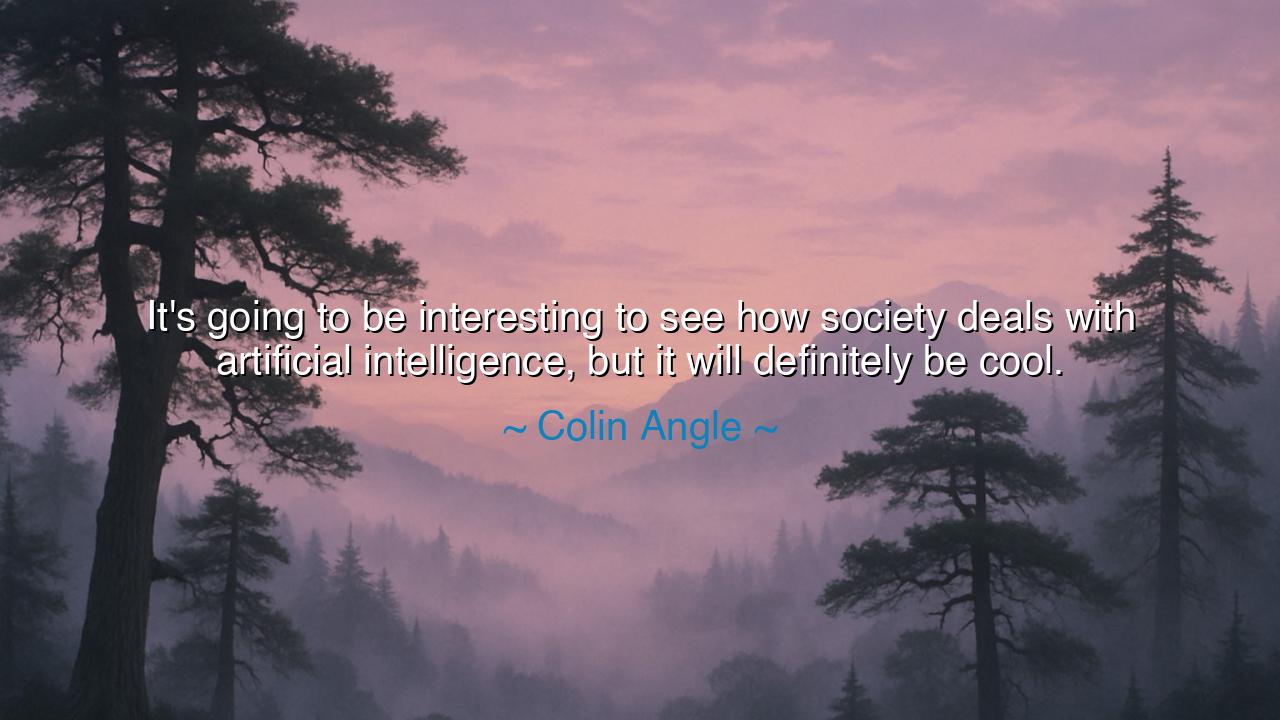
It's going to be interesting to see how society deals with
It's going to be interesting to see how society deals with artificial intelligence, but it will definitely be cool.






"It's going to be interesting to see how society deals with artificial intelligence, but it will definitely be cool." These words, spoken by Colin Angle, hint at a profound and inevitable transformation that is fast approaching—the emergence of artificial intelligence (AI) and its potential to reshape the very fabric of human existence. In this brief statement, Angle captures the awe and uncertainty that accompany great advancements in technology, and yet he looks forward to the unfolding of a new era with the curiosity and optimism that are the marks of a visionary. What is this coolness he speaks of? Is it the excitement of a future shaped by innovation, or is it the mystery of how humanity will learn to live alongside machines that think and feel?
In the ancient world, there were prophecies and legends about forces greater than humanity—forces of nature, gods, and even creations of mankind that were destined to alter the course of history. The great Greek myth of Prometheus, who brought fire to humanity, is a prime example. Prometheus gave mankind a gift that would change their destiny forever, but it came at a price. Fire allowed humanity to rise, to build, and to conquer, but it also brought new challenges and responsibilities. Similarly, the rise of AI offers a gift to humanity—a gift that will, undoubtedly, change the world in ways we cannot fully foresee. But, as with Prometheus' fire, it brings with it both promise and peril.
The coolness that Angle speaks of is not merely in the technological marvels that AI promises, but in the way it challenges humanity to confront its own nature. When the ancient philosophers sought to understand the essence of man, they asked questions about what makes us unique, what makes us human. Now, in the age of AI, we are forced to ask the same questions again, but with new urgency. Can machines think, feel, or dream as we do? If they can, what then is the meaning of human consciousness? The excitement about AI is the excitement of pushing boundaries, of exploring the limits of our understanding and capabilities.
Consider the example of the printing press in the 15th century. At the time, few could have predicted the profound societal changes that the printing press would bring. It was a technology that would democratize knowledge, break down old systems of control, and ignite the Reformation and the Age of Enlightenment. But it also brought challenges—the spread of misinformation, the loss of authority for traditional power structures, and the rise of new questions about truth and knowledge. AI, much like the printing press, is both a tool and a force that will fundamentally change the way we interact with the world around us.
In ancient times, the greatest innovators were those who dared to venture into the unknown. Daedalus, the creator of the labyrinth, built more than just a maze—he crafted the very idea of human ingenuity. The story of Daedalus is not only one of great achievement, but also one of consequence—his inventions led to the downfall of many. The rise of AI will be no different; it holds the potential to solve age-old problems—from healthcare to communication, from transportation to education—but it also introduces new dilemmas, such as ethics, privacy, and control. Just as Daedalus' labyrinth contained a beast that required human intervention, AI presents both a powerful opportunity and a dangerous challenge.
The question remains: how will society deal with this new force? The ancient philosophers often debated whether humanity could ever control the very tools it created. The Greeks had a term for this—the hubris of man, the arrogance that comes with the belief that one can master the forces of nature. Yet, wise men also spoke of the necessity of balance, of using knowledge and power for the good of society. AI calls for the same balance. It offers great potential, but only if we wield it with wisdom, foresight, and responsibility.
Let us take action as we enter this new age. The lesson here is not to fear artificial intelligence, but to approach it with humility, curiosity, and responsibility. Like the ancient heroes, we must master the tools we create, ensuring they serve humanity and not the other way around. Let us embrace the coolness of AI not with reckless abandon, but with the awareness that the choices we make now will shape the world of tomorrow. The gift of AI is in our hands, and it is up to us to use it to uplift humanity, solve the great challenges of our time, and leave a legacy of wisdom for future generations.






AAdministratorAdministrator
Welcome, honored guests. Please leave a comment, we will respond soon